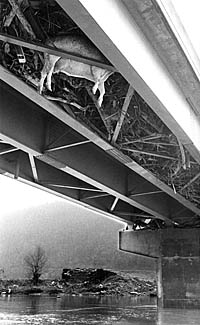Night of Raging Waters
Parsons and the 1985 Flood
By Jerry DiBacco

In early November 1985, West Virginia was hit by the worst flood in 100 years. Tucker County was particularly devastated. Here, a cow carcass is entangled with flood debris beneath the Cheat River Bridge in Saint George. Photograph by John Warner, courtesy of the West Virginia State Archives.
Monday, November 4, 1985, seemed no different than any other Monday in the valley town of Parsons. It was the first day of a new work week, which always seemed somewhat gloomy, as another weekend came to an end. This Monday seemed just a little bit gloomier due to the fact that the weekend rain was continuing to pour. However, this was not unusual for that time of year.
Situated in the Cheat River Valley, Parsons is the seat of Tucker County. With just under 8,000 residents, it is the fourth smallest county in the state and home to just five incorporated towns. Parsons is the largest. Hambleton and Hendricks both lie along the Black Fork River about two miles south of town. The other two towns, Thomas and Davis, are about 14 miles northeast of Parsons, in that area of the county often referred to as being "on the mountain." Other areas of the valley have many smaller communities, plus the unincorporated towns of St. George, Moore, Porterwood, and Bretz.
The Blackwater River, Dry Fork, Black Fork, and Shavers Fork all flow through the county. They come together in the valley and form the Cheat River just north of Parsons.
There is a great difference in the climate between the "valley" and the "mountain." The mountain area is home to two of West Virginia's largest state parks: Blackwater Falls and Canaan Valley. Due to the cold climate and heavy snow conditions in the winter, it is also home to some of the state's larger ski areas, including Canaan Valley and Timberline.
With an unemployment rate of nearly 10 percent in 1985, jobs in the area were hard to come by. The leading employers were Kingsford Charcoal, Parsons Footware, and Hinchcliff Lumber in Hendricks. Ever since the closing of the Parsons Tannery a number of years earlier, the economy continually dropped. The residents seemed somewhat content to be able to live in the area, however, and many considered it to be an ideal place to raise a family. Somehow, they managed to survive.
Like many residents, I had spent the weekend watching football on television. This was a special week for local high school football fans, as our own Tucker County Mountain Lions had qualified for a trip to the West Virginia state play-offs.
For the time being, life went on here in the valley. The rain continued to pour, but it was nothing we were concerned about. At about 4:30 p.m., it was quitting time for me at my job as town serviceman for Mountaineer Gas Company, a job which left me as the only employee stationed in the county. The company had relocated all of the other employees to Elkins, some 22 miles away, leaving me to watch over the entire county, as well as a portion of Grant County.
Shortly after getting home, I sat down to dinner with my wife Donnie — her real name is Madonna, like the singer. Little did I know that the hot meal Donnie had prepared for me was to be my last for sometime to come. Following dinner, I sat in front of the television watching the evening news. Though the local channels were giving flood warnings for our area, we really didn't put much faith in them. We had heard them on a number of occasions in the past, with nothing ever resulting from the threats.
During the news, Donnie asked me to go to the grocery store to pick up an item or two. So I took my pickup truck to the A&P store, Parson's main source for grocery shopping, located on Walnut Street in the business district of town, less than a block from my house.
As I passed the post office, I noticed at the intersection of Walnut and Third streets that the water had completely covered the roadway and was up on the sidewalk. Once again, I paid little heed. That corner has had water on it before, because of the poor drainage conditions in that area.
As I arrived at the market, the store was about to close for the day. I got my few items, and as I was leaving, I came out the door with a longtime friend and store employee by the name of Barbara McClain, who was just getting off work. We saw that the water had now backed up in the street, and the road was completely covered by a few inches.
Barbara's car was parked across the street on the Greenleaf Funeral Home lot. I asked Barbara to get in my truck, and I would drive her through the water to the other side of the street. As she got out of my truck to get into her car, she jokingly said, "Thanks for the lift. Don't get washed away tonight."
Little did we know how telling her statement was going to be in just a matter of a few hours.
You can read the rest of this article in this issue of Goldenseal, available in bookstores, libraries or direct from Goldenseal.